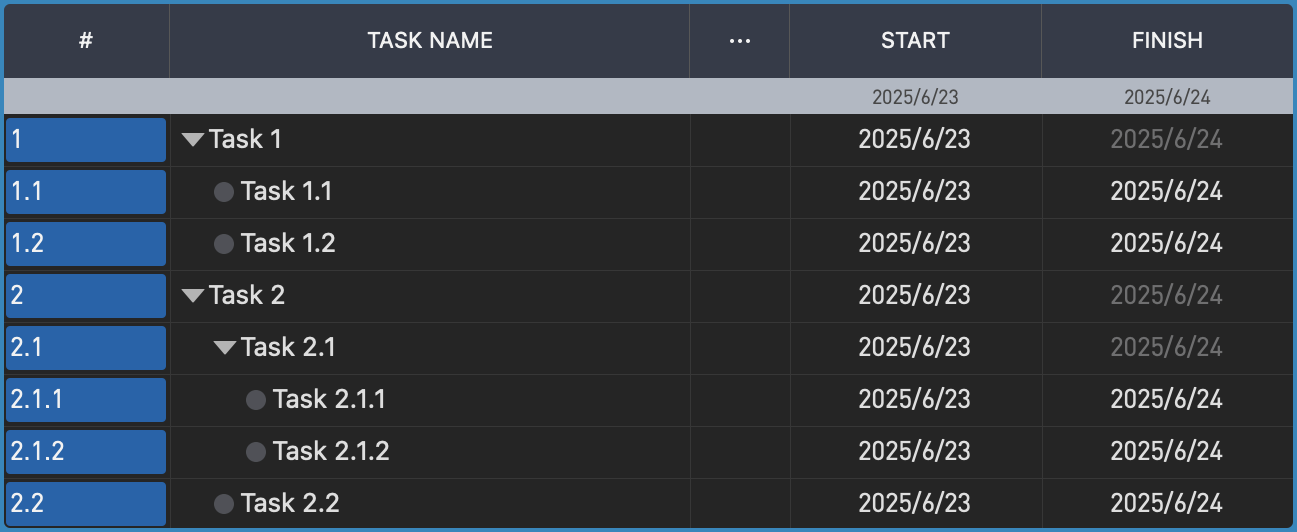Creating Tasks in Table and Gantt View
Table View and Gantt Chart are the primary and traditional views for managing project tasks. QuickPlanX makes task creation simple and efficient by supporting both continuous input and bulk input.
Continuous Input
At the footer of the table view, you can continuously add tasks to the end of the list. You have the option to insert a space at the beginning of the task name to adjust the task hierarchy.
Steps
- Enter the name and press the "
Return" key to create a new node. You can continue entering tasks without interruption. - The newly created task will be at the same outline level as the last task in the list.
- Add a "
space" character at the beginning of the name to make the new task a child of the last task in the list. - Add an "
/" character at the beginning of the task name to create a new task at the highest outline level, independent of the previous task's level. - Click the "
Close" button to stop adding new tasks.
Demonstration on Mac
Demonstration on iPad
Bulk Creating
In addition to entering tasks one by one, QuickPlanX allows you to create multiple tasks at once by inputting multiline text.
- Each line represents the name of a task.
- Add a "
space" character at the beginning of the task name to adjust the task hierarchy.
Example
-
Input multiple lines of text as shown below:
Task 1
Task 1.1
Task 1.2
Task 2
Task 2.1
Task 2.1.1
Task 2.1.2
Task 2.2 -
The new tasks will be created as follows:

You can be highly efficient by using the bulk insert options.
Demonstration
Watch this video demonstration to learn how to bulk create tasks on Mac and iPad:
Inserting Tasks
To add new tasks to a project that already contains tasks, simply select an existing task and choose whether to insert the new task as a child or as the next sibling.
On Mac
On macOS, QuickPlanX supports intuitive gestures, contextual menus, application menus, and keyboard shortcuts. For maximum efficiency, we recommend using keyboard shortcuts.
- Press the "
." key to add a new child task to the selected task.- If you do not hold the "
Shift" key, the newly created child task will become selected. - If you hold the "
Shift" key (⇧) while adding a new child task, the current selection remains unchanged.
- If you do not hold the "
- Press the "
/" key to add a new sibling task immediately after the currently selected task. - Press the "
Command" and "d" keys (⌘d) to duplicate the selected task as the next sibling.
On iPhone and iPad
On iPhone and iPad, QuickPlanX features an action bar with context-sensitive buttons and menus, making task insertion fast and convenient.
The buttons displayed on the action bar depend on which part of the selected task is active in the Table view:
- If the
WBScell of the selected task is active, or if no cell is active, theaction barshows options for operating on the entire task. - If another cell (not the
WBS) is active, theaction bardisplays options relevant to that specific cell.
Switching the selected task or the active cell is simple:
- Tap another task to select it.
- Tap a cell in the
Tableview to make it active. - Tap the selected task again in the Gantt chart to clear the active cell (so that no cell is active).
When no cell or the WBS cell is active for the selected task, the action bar provides options to insert a child task, insert a sibling task, or duplicate the selected task.
- Insert a new task as a child of the selected task.
- Insert a new task as the next sibling.
- Duplicate the selected task as the next sibling.
Tips
- When creating a new project, it is recommended to construct the task tree first before setting task dates and other properties.
- The
TreeandColumnviews are more intuitive and straightforward for building tasks in a tree structure. It may be more comfortable to create tasks in these views first, then adjust task dates as needed. - Even if you are already working efficiently with these basic operations, we still recommend considering the following options for even greater efficiency.
Be More Productive
QuickPlanX offers advanced features to help you work efficiently, such as adding tasks by copy/paste and drag/drop, splitting tasks via gestures and menus, and bulk creating and updating tasks.
Learn more about Batch Insert and Update Tasks.